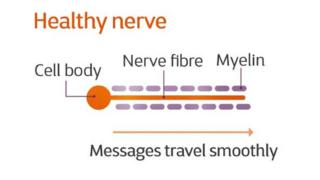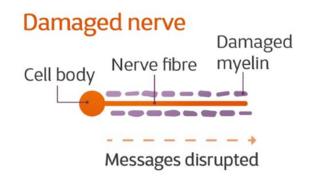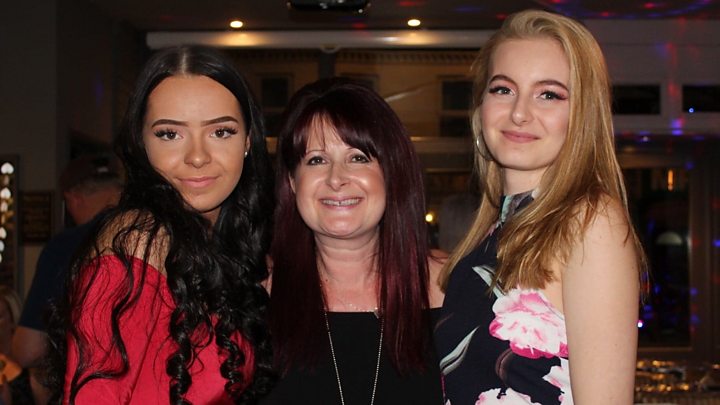[ad_1]
Image copyright
Bella Parkhouse
Bella (second left) with her family
When Bella Parkhouse was told by a hospital consultant she had multiple sclerosis (MS) at just 15 years old, she surprised everyone in the room by laughing.
“I’ve got a nervous giggle – I was trying to hold it in,” she says. “I thought ‘ah well, it’s got a name now’. Nothing’s actually changed.”
Beyond the nervous laughter, Bella’s diagnosis was unusual.
Most people diagnosed with MS are in their 20s or 30s but Bella was in the 10% of those aged under 18 and she was going to have to get to grips with the life-changing neurological condition while still a teenager. Diagnosed two years ago, she is now 17.
For years Bella had experienced mysterious symptoms like fatigue and dizzy spells
“Growing up, I remember my sides were really painful to touch,” she says. “I just thought humans are weird and we all had it.
“Just before I got diagnosed, there were about three or four days where I was so dizzy that I could not move.”
MS prevents the immune system from working properly. Your immune system is supposed to protect you by fighting off infections, but if you have MS, it attacks and damages your nerves.
Damaged nerves cause problems with vision, balance and muscle control.
It makes it hard to do everyday tasks like walk and talk. Thinking can also be difficult, a symptom often referred to as brain fog.
When Bella realised she could no longer read the board at school she decided to get her eyes tested but was quickly referred to hospital for further tests.

Image copyright
The MS Society
This is what a healthy nerve should look like.

Image copyright
The MS Society
For comparison, this is what a damaged nerve looks like
She had an MRI scan and then a lumber puncture – a brain and body scan then a spinal fluid test – but the doctors had already speculated it was likely to be MS. While the results were being processed she was told to “Go home, Google it and see how you feel”.
Sarah, Bella’s mum, says she was “petrified” when this was suggested.
“You’re always told ‘don’t start looking it up on the internet, you’ll end up thinking you’ve got all sorts’,” she says.
The family stayed away from Dr Google to prevent any unnecessary worry, but the hospital quickly confirmed the family’s fears – Bella had MS, and that’s when she started laughing.
MS affects a substance called myelin which is a fatty sheath found around nerve fibres.
Dr Susan Kohlhaas, Director of Research at the MS Society, says: “The brain tells your body everything it needs to do and those messages go from your brain to the rest of your body really quickly.”
With damaged myelin, the brain can’t communicate with the body as easily. “The damage affects how quickly and accurately those messages get through,” she says.
While it’s not known what causes people to have MS, Dr Kohlhaas says a lack of vitamin D could be a contributing factor as well as obesity and smoking.
“For reasons we don’t fully understand, some environmental factors influence who gets it,” she says. “The further you live from the equator, the more likely you are to develop MS.
“But we still don’t understand how MS manifests itself in younger people.”
About 100,000 people in the UK have the condition. Of those, 85% have relapsing and remitting MS (RRMS) while the remainder experience primary progressive MS, where symptoms gradually get worse over time.
Bella has the relapsing remitting variety and so experiences attacks. It is difficult to predict when they will arrive and how severe they will be.
Following her diagnosis at 15 she was transferred to Great Ormond Street Children’s Hospital where they try to make visits as fun as possible.

Listen to the podcast

Media playback is unsupported on your device
Listen to Bella talk about living with MS and balancing her social life in The secret life of a teenager with MS podcast

When she has an MRI scan to check the progress of the condition Bella says: “You get to watch a movie or listen to music.” Mamma Mia was her favourite although she admits: “It was hard to stay still watching it.”
Bella has been treated at Great Ormond Street for over a year and hasn’t had any relapses in months, enabling her to get on with her life.
As a teenager with a busy social life she does all she can to join in with friends and family, but has to pace herself and manage her FOMO – Fear of Missing Out.
“I like to plan things ahead. I want to know what I’m doing and when.”
If she has a big event coming up, like a birthday, Bella says: “I’ll rest the day before, then go all out, completely, with my friends. I’ll just be prepared to rest the next day, too.”
She has learnt how to balance school and a part-time job as well as manage the fatigue and pain that the condition brings.
One activity she finds beneficial is swimming and she is now training to become a swimming teacher.
“When I’m in the water it’s like I haven’t got MS,” she says. “I don’t get any pains, I don’t really get tired.”
Though she has a support network, Bella has learnt who her good friends are the hard way.
“I’d been to a few parties and not had a drink. Everyone accepted that,” she says. “I’d down a bottle of water and they’d all be cheering.”
To some, though, she’s a “party pooper” even though it’s widely known that alcohol can make her fatigue symptoms worse.
Bella recalls going to Reading Festival in 2018, where she was “falling all over the place” from dizziness.

Bella’s tips managing MS
- Don’t let it stop you – There’s loads of stuff that you can do, you just have to be open-minded and try new things.
- This isn’t for everyone, but if you can, laugh about it – Admit it, you would giggle if you had to down a bottle of water during a drinking game with your mates.
- Don’t plan too far ahead – MS is so unpredictable that it won’t allow for that.

One friend suggested they go back to the tent, but another said she was boring and was bringing the mood down.
Bella doesn’t accept people who think like this. “If you’re not going to be nice,” she says, “then I can’t be bothered.”
As well as having an active social life and part-time job at the swimming pool, Bella organises her own hospital appointments and manages medication by herself. Impressive for any 17-year-old.
“It’s weird because a lot of my friends still have to ask their mums to go out. I just like the independence,” she says.
Sarah says she tries to advise her daughter as best she can, especially if she seems tired, “but Bella doesn’t like anything to stop her”.

Sarah’s tips for parents
- Talk to people – The more I talk about it, the more I can cope with it.
- Carry on as normal – You cannot let it take over your lives.
- There are hospital appointments and medications, but try and turn negatives into positives.

Bella is at college studying Psychology, Business Studies and English. She wants to do a degree apprenticeship in Business which she hopes will give her the flexibility and independence to work while she manages her condition.
“I don’t like sitting down because I’m just not as focussed – my mind wanders and I get much more pain. I’d rather be working and learning.”
Neither Bella nor her mum know what is around the corner with juvenile MS – but they do agree on one thing.
“Listen to your body – and don’t be afraid to say ‘no’,” no matter how much FOMO you get.
For more Disability News, follow BBC Ouch on Twitter and Facebook, and subscribe to the podcast.
[ad_2]
Source link
